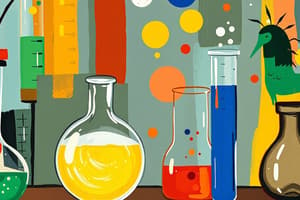Podcast
Questions and Answers
What is the purpose of statistical significance in research?
What is the purpose of statistical significance in research?
- To establish causation
- To confirm the null hypothesis
- To determine if an observed effect is likely due to chance (correct)
- To set the significance level at 0.05
Which of the following best describes experimental design?
Which of the following best describes experimental design?
- The number of participants in the study
- The framework for testing hypotheses and setting up experiments (correct)
- The criteria for determining the research hypothesis
- The process of establishing statistical significance
What is the role of a null hypothesis in hypothesis testing?
What is the role of a null hypothesis in hypothesis testing?
- Refutes the observed data
- Determines the significance level
- Assumes no effect or relationship exists in the population (correct)
- Supports the research hypothesis
How does statistical significance impact hypothesis testing?
How does statistical significance impact hypothesis testing?
Why is a well-designed experiment crucial in scientific research?
Why is a well-designed experiment crucial in scientific research?
What is the main purpose of blocking in experimental design?
What is the main purpose of blocking in experimental design?
Why do researchers use blocking in factorial designs?
Why do researchers use blocking in factorial designs?
In a randomized complete block design (RCBD), why are each treatment tested on the same number of experimental units in each block?
In a randomized complete block design (RCBD), why are each treatment tested on the same number of experimental units in each block?
When is a fixed block design used in experiments?
When is a fixed block design used in experiments?
How does blocking help researchers separate systematic error from random error in experiments?
How does blocking help researchers separate systematic error from random error in experiments?
Flashcards are hidden until you start studying
Study Notes
Hypotheses: Understanding the Basics of Scientific Inquiry
Hypotheses are the heart of scientific inquiry. They serve as testable statements that help to guide experiments and research studies, allowing us to make evidence-based conclusions about the natural world. In this article, we'll delve into the various types of hypotheses—null, research, statistical significance, and experimental design—while maintaining a factual and informative tone.
Null Hypothesis (H0)
The null hypothesis, often denoted as H0, is a statement of no difference or no relationship between variables. It assumes that there is no effect or no relationship where one is being tested. For example, a null hypothesis might state that there is no difference in the average weight of two groups, given a specific intervention or no intervention. This statement is often contrasted with the research hypothesis, which is the alternative to the null hypothesis.
Research Hypothesis (H1)
The research hypothesis, often denoted as H1, is a statement of a difference or a relationship between variables. It is the alternative to the null hypothesis. For example, a research hypothesis might state that there is a difference in the average weight of two groups, given a specific intervention. The research hypothesis is directly opposed to the null hypothesis, and if the results of an experiment or study support the research hypothesis, they contradict the null hypothesis.
Statistical Significance
Statistical significance refers to the likelihood that an observed effect or relationship is due to chance, rather than the result of the manipulation or condition being tested. In other words, it is the probability that the null hypothesis is true. In research, a statistically significant result is one that is unlikely to have occurred by chance alone. To determine statistical significance, we often use a significance level or alpha (α), which is usually set at 0.05. If the probability of the observed effect occurring by chance alone is less than 0.05, we say that the result is statistically significant at the 0.05 level.
Experimental Design
Experimental design is the framework by which hypotheses are tested. It encompasses the specifics of how an experiment or study is set up, including factors such as the type of design (e.g., randomized controlled trial or observational study), randomization, the number of participants, and the specifics of data collection. The experimental design influences the validity and reliability of the results, and a well-designed experiment is crucial for drawing accurate conclusions.
Hypothesis Testing
Hypothesis testing is the process of determining whether the data collected from an experiment or study supports or refutes the null hypothesis. Statistical tests are used to compare the observed data to what we would expect if the null hypothesis were true. If the data is not consistent with what we would expect based on the null hypothesis, we reject the null hypothesis and conclude that the research hypothesis is likely to be true.
In summary, hypotheses are an essential component of scientific inquiry. They provide a structure for testing specific predictions, and in turn, they help to generate new knowledge and insights. By understanding the different types of hypotheses—null, research, statistical significance, and experimental design—we can better appreciate how they allow us to test, refine, and expand our understanding of the world around us.
Studying That Suits You
Use AI to generate personalized quizzes and flashcards to suit your learning preferences.




